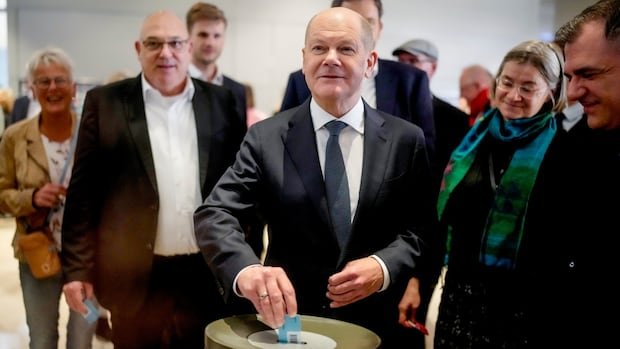The German parliament on Monday heeded Chancellor Olaf Scholz’s call to withdraw confidence in him and his government, clearing the way for early elections on February 23 made necessary by the collapse of his government.
Scholz’s three-party coalition collapsed last month after the pro-market Free Democrats defected one after another over the debt, leaving his Social Democrats and the Greens without a parliamentary majority, just as Germany faced a deepening economic crisis.
Under rules designed to prevent the instability that fueled the rise of fascism in the 1930s, President Frank-Walter Steinmeier can dissolve parliament and call new elections only if the chancellor calls a no-confidence vote and loses.
Only 207 of the 733 members of Parliament expressed their confidence, while 394 withheld their confidence.
“The motion has been accepted,” said Parliament President Baerbel Bas.
Merz attacks Scholz’s record
The chancellor and his conservative challenger Friedrich Merz clashed angrily in a debate before the vote, accusing each other of incompetence and a lack of vision.
Scholz of the Social Democratic Party (SPD) defended his role as crisis leader dealing with the economic and security emergency triggered by Russia’s full-scale invasion of Ukraine. If given a second term, he said he would invest heavily in Germany’s crumbling infrastructure and not make the spending cuts desired by the conservatives.
“Myopia may save money in the short term, but the mortgage on our future is unaffordable,” said Scholz, who was finance minister for four years in a previous coalition with the Conservatives before becoming chancellor in 2021.

Merz, of the Christian Democratic Union (CDU), once led by Angela Merkel, told Scholz that his spending plans would burden future generations and accused him of failing to keep his promises to rearm after the start of the Ukraine war.
“Incurring debts, spending money at the expense of the young generation – and the word ‘competitiveness’ was never mentioned once,” said Merz.
None of the leaders mentioned Germany’s constitutional spending cap, a measure designed to ensure fiscal responsibility but which many economists blame for the dilapidated state of Germany’s infrastructure.
After Scholz loses the vote on Monday, he can ask President Frank-Walter Steinmeier, who has already approved his schedule, to dissolve parliament. Scholz will remain interim chancellor until a new government can be formed after the planned election on February 23rd.
Right-wing extremist AfD
The CDU has a comfortable, if shrinking, lead of more than 10 points over the SPD in most polls. The far-right Alternative for Germany (AfD) is just ahead of Scholz’s party, while the Greens are in fourth place.
Mainstream parties have refused to govern with the AfD, but its presence complicates parliamentary arithmetic and makes unwieldy three-party coalitions like Scholz’s more likely.
Meanwhile, Scholz has outlined a list of measures that could be passed before the election with opposition support, including 11 billion euros (16.45 billion Canadian dollars) in tax cuts and an increase in child benefits, which former coalition partners have already agreed to have agreed.

Measures to tackle the fiscal strain appear less certain, while Merz said he would not support a Green Party proposal to cut energy prices and said he wanted a completely new energy policy.
Robert Habeck, the Green Party’s candidate for chancellor, said the stance was a worrying sign for German democracy given the increasing likelihood that very different parties would have to work together in government in a fragmented political landscape.
“It is very unlikely that the next government will have it easier,” said Habeck. “It is very unlikely that the Conservatives, the SPD or the Greens will get an absolute majority.”
Conservatives have suggested they could support measures to better protect the Constitutional Court from the machinations of a future populist or anti-democratic government and to expand a popular subsidized ticket.
After the collapse of Bashar al-Assad’s government, AfD leader Alice Weidel called for the repatriation of all Syrian refugees in Germany.





